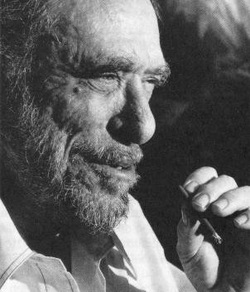
Now that's a pretty bold statement - but it is only bold if it is authentic. Unfortunately, stating that one writes simply for the love of writing has also become a terrifyingly trite and contagious cliche. I can't begin to tell you how many times I've seen writers express the same sentiment in their author blogs, blog tours, author interviews, etc. It's a noble sentiment isn't it? It's also a good lifeboat to cling to if your writing never goes anywhere in the world.
Now, I personally know a few writers who are being honest when they claim they write simply for the passion of writing. Like me, they haven't reached any notable level of name recognition or financial gain; nevertheless, they plug away at their stuff all the same happy to have the chance to produce work and get out there. And I'll give the benefit of doubt to a few more writers I don't know who surely do it "for the love it" - writers who write stories about people and places that will never capture the attention of the masses spring to mind.
But I find it impossible to believe that success and fame in publishing are not the primary motivations behind most writing being produced today. This especially holds true for all the mimickers and gimmickers that chase the latest fads and trends hoping their version of the latest sado-masochistic, love-sick zombie-vampire saga will be the next Twilight or Fifty Shades of Grey. When those guys tell me they do it for the love of writing, I can't help but snicker just a little. But hey, who am I to judge?
Regardless, I believe there are writers, honest writers who do write because they are driven to write. Though I am certain most would welcome a little extra cash and some of the other perks that come with "success", I have a feeling most will continue to write even if they never attain those things. The question is - why? Why would a person write if they didn't harbor dreams of hitting it big?
The answer to that is both simple and profound. Writers who write for the love of writing experience an entirely different realm of existence when they sit down to put their thoughts to paper. To writers of that caliber, the act of creation is a far more important matter than the dissemination and eventual success or failure of their creation. They write primarily for themselves, these writers. For them, writing is more than mere careerism and the acquisition of a few petty laurels. For them, writing is survival - the essence of life itself.
Charles Bukowski is a good example of a writer of this kind. My favorite Bukowski poems are the ones that deal with his creative process - the sitting down at the desk late at night, the turning on of the classical music on the radio, the opening of a bottle of wine, the lighting of a cigarette, the kissing of the typewriter, and finally, the act of creation itself. The sheer joy, the absolute ecstasy Bukowski expresses when he describes how he crafted his poems is almost religious in nature.
Of course, Bukowski eventually went on to attain a high level of "success" in his lifetime and his poems are still in print all over the world. Oddly enough, his descriptions of his success in publishing never rival his descriptions of the act of writing itself. In fact, he has an almost dismissive view of his published work. It is of secondary importance to him, as displayed in the quote below:
'But, bottom line, when I write, it's for me. (He draws a deep drag off his cigarette.) It's like this. The "drag" is for me, the ash is for the tray... that's publication.'
I wonder how many writers who claim to write for the love of writing truly feel the same way?

 RSS Feed
RSS Feed

